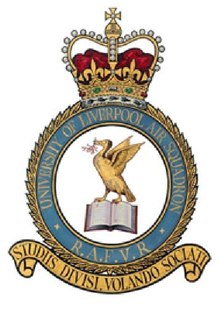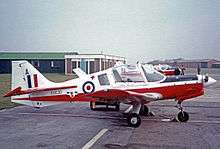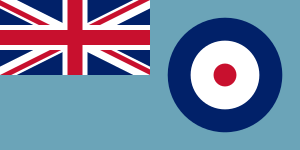Liverpool University Air Squadron
Liverpool University Air Squadron (LUAS /luˈæs/) is a training unit of the Royal Air Force which provides basic flying training, adventurous training and personal development skills to undergraduate students of the University of Liverpool, University of Lancaster, Edge Hill University, Bangor University and Liverpool John Moores University.
| Liverpool University Air Squadron | |
|---|---|
 | |
| Active | 13 January 1941 - present |
| Country | |
| Branch | |
| Role | Officer Training, Ab Initio Flying Training, Recruiting |
| Part of | 6 FTS |
| Garrison/HQ | RAF Woodvale |
| Nickname(s) | LUAS |
| Motto(s) | Latin: Studiis Divisi Volando Sociati "By Studies they be divided, yet by flying they are united"[1] “If you believe, you will achieve” |
| Mascot(s) | Major Meers (Stone Meerkat) |
| Commanders | |
| OC LUAS | Squadron Leader R Hurcomb |
| Notable commanders | Air Vice Marshall Edward Stringer |
| Aircraft flown | |
| Trainer | Grob Tutor T1 |
History
Liverpool UAS was formed on 12 January 1941 and attached to RAF Speke. It was disbanded on 30 June 1946. It reformed on 1 December 1950 at RAF Hooton Park and moved to RAF Woodvale on 13 July 1951.[2] The De Havilland DH.82 Tiger Moth was flown between 1941 and 1952. De Havilland Chipmunks were flown from 1952 until 1975 when the Scottish Aviation Bulldog was received.[3] The present Grob 115 Tutor aircraft were delivered in 1999 and this type still equips the squadron.
Activities
The idea behind all University Air Squadrons is to allow potential RAF officers to experience life in service and to allow them to decide whether they are suited to it. There is no obligation to join up, unless a bursary is successfully applied for. LUAS is parented by RAF Woodvale where it flies Tutor aircraft.
Flying

Students follow a modified form of the Elementary Flying Syllabus covering the basics of flight up to solo navigation exercises. Students that complete this initial syllabus can then progress to the Advanced Flying Syllabus and learn formation flying, aerobatics, and low level navigation skills. Each student is officially allocated 10 hours of flying training each year, though occasionally some flyers exceed this number. Some individuals apply for a PPL from their flying experience on the UAS.
The flying aspect of the LUAS is overseen by the Commanding Officer (OC LUAS) and the Chief Flying Instructor (CFI), both of which are RAF Qualified Flying Instructors (QFI). Additional Instructors are sometimes available on flying Training Periods.
All flying is based at RAF Woodvale where the Grob Tutor is used as the instructional aircraft.
Successful completion of the Core Syllabus qualifies the student pilot for the award of the Preliminary Flying Badge, or 'Budgie Wings' as they are sometimes called.
Adventurous Training
LUAS participates in many forms of adventurous training, including climbing, canoeing, kayaking, mountaineering, sailing, ski touring and mountain biking. The squadron's Ground Training Instructor (GTI), an NCO, facilitates many of the above activities, but most activities and exercises are organised by students - either individually, or in small groups.
LUAS relies heavily on student instructors for adventurous training (AT). Qualifications can be gained by attending a Joint Services Adventure Training (JSAT) course,[4] which is usually free. Students attending will be taught the necessary techniques for successful and safe instruction in their chosen discipline, and can then lead others on AT.
Expeditions Abroad
LUAS members are fortunate to be in a position to organise and participate in overseas expeditions. In previous years small deployments to Canada, and dog sledding, and skiing in the European Alps have been popular and worthwhile ventures, including rock climbing, mountaineering, mountain biking and paddle sport. With new austerity measures sweeping all public services in the UK, overseas expeditions are increasingly rare.
With an enhanced emphasis on expeditions, the RAF no longer supports exclusive downhill skiing and instead focuses on the significantly more arduous ski touring.
Mountaineering and Rock Climbing
In addition to larger expeditions, weekends in the Yorkshire Three Peaks, Lancashire countryside, Snowdonia National Park and Brecons Beacons of Wales to improve climbing and mountaineering skills are a regular occurrence. Organised and led by students, with little staff involvement, these weekends are excellent for fine tuning leadership skills and practicing being adaptable and flexible.
Yacht Sailing
LUAS members have the opportunity to go yacht sailing on a regular basis - students can organise expeditions at any time of the year through the Joint Services Adventurous Training Centre. Student instructors are only too happy to take personnel sailing and teach them how to effectively crew a 30+ foot yacht. Apart from teaching the skills required to sail a yacht from A to B, students get used to living in close quarters with one another with few luxuries, and are often tested by the weather. A high degree of autonomy is enjoyed - improving leadership, communication and awareness skills being the primary objectives. In Summer 2010, a two-week expedition led by a student along the south coast of the UK reached Dartmouth in fairly challenging weather.
Joining
Students can join LUAS in any year at university and usually stay for two years, provided their attitude and commitment are good. Students from higher education establishments around the North West may apply to join, but due to time and personnel constraints, LUAS only attends the University Fresher's Fairs of Liverpool and Lancaster. Students who are deemed an asset may be invited to continue their careers with LUAS and stay for a further year, subject to them remaining in university and remaining committed to the squadron. To join, students simply attend a Fresher's Fair at university and talk to one of the students. After completing the joining process a successful student would be attested and become a member of the Volunteer Reserve.
Fitness
Once attested, students have to pass a medical and a fitness test. The standard is 9.10 on the bleep test, 20 press ups and 35 sit ups. While these are the minimum standards for joining, individuals who are fitter tend to benefit more from UAS membership.
Bursaries
Bursaries are available for most branches and can be applied for before joining (conferring automatic UAS membership) or after joining a UAS. The current system gives a successful candidate £6,000 over the course of their degree. The application process consists of an informal chat with UAS staff or an interview at a career office, for UAS members and non-members respectively. If successful an invitation for selection at the OASC may follow. Successful applicants will be expected to be an example on their squadron and must join the RAF on completion of their degrees, or return all bursary monies.
Structure
The Commanding Officer (OC LUAS) has overall responsibility, supported by the Adjutant who oversees administrative tasks and is supported by office staff at the squadron's headquarters. The student body has a Senior Student, usually an Acting Pilot Officer (APO) who is essentially heads up the student body, and aside from the extra commitment organising activities, he or she acts as a liaison to the permanent staff. The Senior Student is supported APOs, who oversee the students participation at the airfield and on other aspects respectively.
They are assisted by an executive committee which is chosen from the student body each year. Positions include Adventurous Training Executive, Sports Executive, Charity and PR (Public Relations) Executive, Force Development Executive and Entertainments Executive. There is a Mess Secretary who records the minutes of Executive Committee meetings and oversees the Mess Committee (below). A Mess Committee is also elected each year, the above roles serve the function of allowing LUAS to efficiently organise and de-conflict events and activities in a coherent manner.
See also
- Birmingham University Air Squadron
- East of Scotland Universities Air Squadron
- Oxford University Air Squadron
- Southampton University Air Squadron
- Universities of Glasgow and Strathclyde Air Squadron
- University Royal Naval Unit, the Royal Navy equivalent
- Officers Training Corps, the British Army equivalent
- List of Royal Air Force aircraft squadrons
References
- Sturtivant, R.C., Royal Air Force Flying Training and Support Units, Air-Britain (Historians) Ltd, 1997, ISBN 0-85130-252-1.
- Pine, L.G. (1983). A dictionary of mottoes (1 ed.). London: Routledge & Kegan Paul. p. 223. ISBN 0-7100-9339-X.
- Sturtivant, 1997, p307
- Sturtivant, 1997, p. 307
- JSAT Courses
